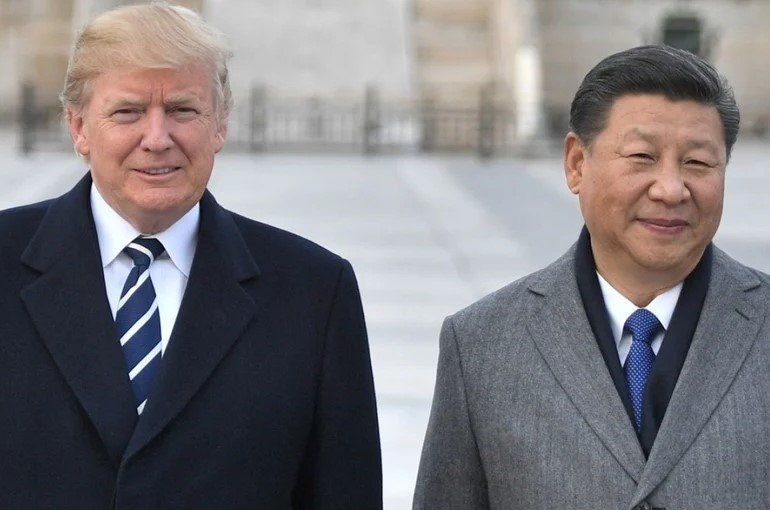As Washington eyes tariff exemptions for allies that sideline Beijing, China hits back with stark language and veiled threats
In a rare but sharply worded statement, China has issued a clear warning to countries considering trade deals with the United States that undercut Beijing. The message? Don’t think you’ll get off easy. Because if you do Washington’s bidding at China’s expense, there will be consequences.
The warning follows reports that the Trump administration is readying a plan to reward countries with tariff exemptions — but only if they dial down trade with China. That’s setting off alarm bells in Beijing, where officials are already preparing to respond with what they call “countermeasures.”
A loaded phrase: “Appeasement will not bring peace”
This wasn’t your standard diplomatic jargon. In fact, the language Beijing used raised eyebrows.
“Appeasement will not bring peace, and compromise will not be respected,” said a spokesperson from China’s commerce ministry.
That one-liner hit like a brick through a window. It echoed Cold War rhetoric, when rival powers viewed any sign of cooperation with the “other side” as betrayal. But China didn’t stop there.
Translation? If you cut a deal with Trump’s America that undercuts Beijing, you’re walking into danger. And you better know what you’re doing.

What the Trump administration is really up to
According to Reuters and AFP, Trump’s trade team is exploring a workaround to its tough tariff regime. Countries that fall in line — by reducing ties with China or avoiding certain sectors — could get a hall pass. In other words, lower tariffs.
• These exemptions are reportedly being discussed with several key allies, including some European and Asian partners
• The idea is to use trade carrots, not just sticks, to isolate China economically
• Critics say this could effectively turn U.S. allies into trade proxies in a broader economic confrontation
It’s economic warfare, but dressed up in policy. And while it’s not a new play — Trump pushed similar tactics during his first term — the aggression now is far less subtle.
Beijing feels boxed in — and it’s not sitting idle
China sees this move as part of a wider effort to box it in. It’s not just about tariffs or exports. It’s about power and positioning.
Over the past year, the U.S. has restricted Chinese access to advanced chips, sanctioned tech firms, and curbed outbound investment in sensitive sectors. On top of that, Trump’s administration has pressured partners to ditch Huawei, push Chinese platforms out of app stores, and ban Chinese drone components in infrastructure.
Beijing knows what’s happening. And it’s responding.
In just the past few months:
-
China has cut rare earth exports to U.S. defense firms
-
It’s signed fresh energy deals with Russia and Iran
-
It’s doubled down on self-reliance in chip design and aerospace
The new warning, then, is not idle chatter. It’s a signal. If you align with Washington against us, you’ll feel the squeeze too.
Can allies afford to play both sides?
This puts countries in a tight spot — especially those caught between two giants.
Let’s take South Korea, Germany, or Australia. All have deep trade ties with both China and the U.S. Cutting off China risks major economic pain. But defying Washington might mean getting slapped with fresh tariffs.
A table below outlines just how intertwined these economies are with China:
| Country | % of Total Trade with China | Key Chinese Exports to These Countries | Risk if Trade Falls |
|---|---|---|---|
| South Korea | 25% | Electronics, machinery | Semiconductor shock |
| Germany | 18% | Vehicles, medical tech | Auto supply crunch |
| Australia | 30% | Iron ore, coal, education | GDP contraction |
So what’s the move here? For many, it’s a delicate dance. They may delay making trade concessions to the U.S., hoping this pressure campaign fizzles out. Or, they’ll try to split the difference — offering just enough to appease Washington without angering Beijing.
The stakes go far beyond trade
This is more than a fight over aluminum or iPhones. It’s a litmus test for global alignment in the new world order Trump is trying to shape.
Trump’s second-term foreign policy looks like a full-on pivot: away from multilateralism, away from global institutions, and toward raw transactional deals. In that world, everything is a deal — and everything is leverage.
But China has its own red lines. And now, it’s telling the world where those lines are.
If Beijing starts punishing countries economically — or pulls the plug on critical exports — the ripple effects could hit global markets fast. Supply chains would scramble. Prices would spike. Alliances could fracture. This is how economic fights spill into geopolitical ones.
What happens next?
That depends on whether Trump pushes this trade-for-loyalty campaign into official policy — and whether any major countries actually take the bait.
So far, most are watching and waiting. European leaders have said little publicly. Japan’s foreign ministry dodged questions. And in Seoul, officials said only that they would “prioritize national interests.”
But if Trump turns up the pressure — and countries start picking sides — the global trade map could get redrawn fast.
